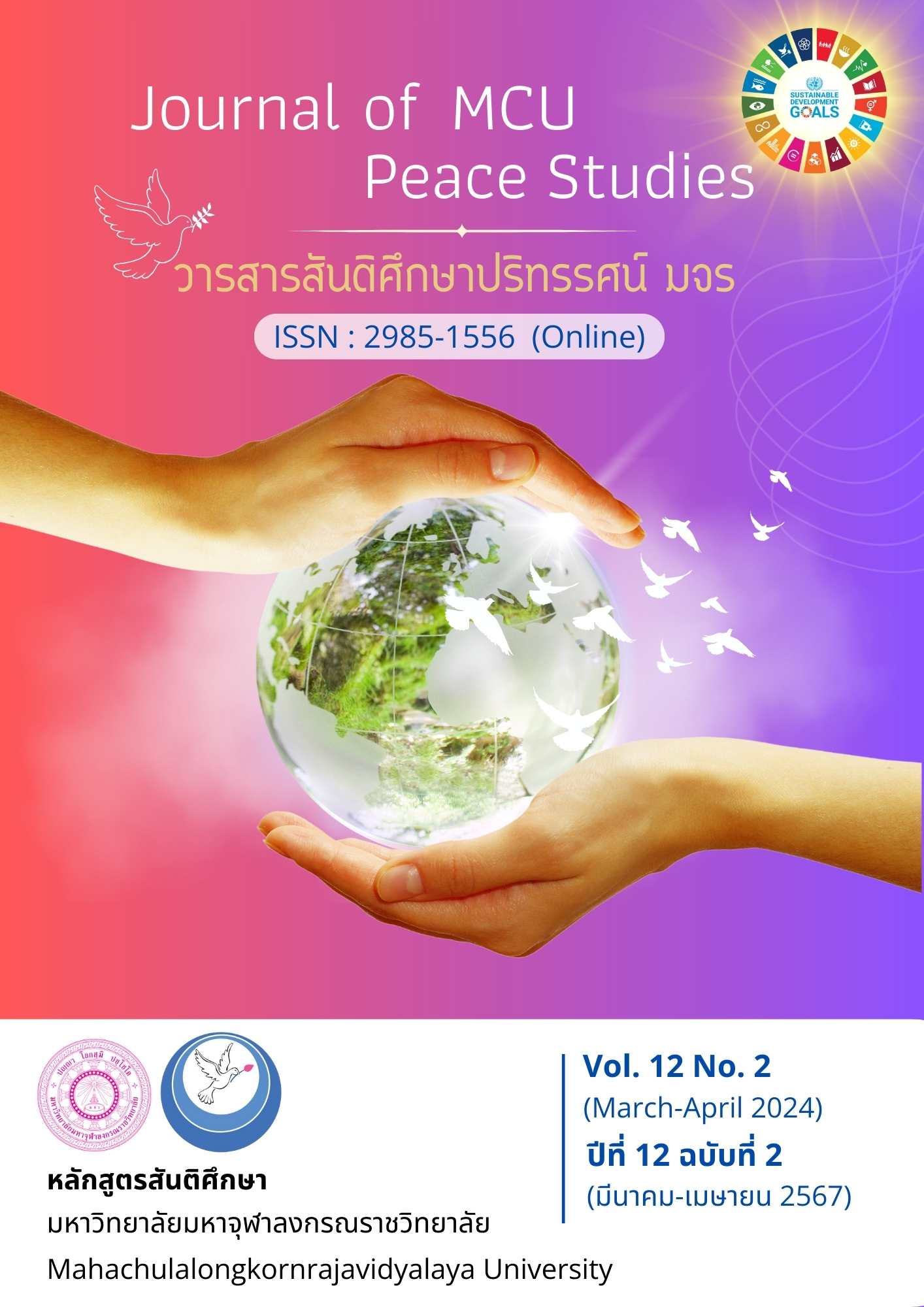Language Teaching Efficiency through E-pedagogy between Learners and Teachers Collaboration toward English Education Movement in Southeast Asia
Main Article Content
บทคัดย่อ
This article examines the efficiency of e-pedagogy in fostering collaboration between learners and teachers in the context of the English education movement in Southeast Asia. With the rapid advancement of technology and the increasing demand for English proficiency, educational institutions have been compelled to adopt e-pedagogy as an alternative mode of instruction. However, there is a need to assess the effectiveness of this approach in promoting collaborative learning in the face of new challenges. This study also reveals the challenges and opportunities encountered by learners and teachers. Preliminary discussions reveal that e-pedagogy facilitates greater collaboration by providing a platform for interactive discussions, shared resources, and instant feedback. Moreover, e-pedagogy empowers learners to take ownership of their learning process, enhances their communication skills, and promotes self-directed learning. However, this also uncovers various challenges, including technological barriers, and the need for pedagogical support. The outcomes contribute to the understanding of the efficacy of e-pedagogy in Southeast Asian English education context. The conclusion and suggestions inform educational policymakers, institutions, and educators on the potential of e-pedagogy to foster collaboration and address the evolving challenges of the English education movement in Southeast Asia.
Article Details

อนุญาตภายใต้เงื่อนไข Creative Commons Attribution-NonCommercial-NoDerivatives 4.0 International License.
ทัศนะและความคิดเห็นที่ปรากฏในบทความในวารสาร ถือเป็นความรับผิดชอบของผู้เขียนบทความนั้น และไม่ถือเป็นทัศนะและความรับผิดชอบของกองบรรณาธิการ ยินยอมว่าบทความเป็นลิขสิทธิ์ของวารสาร
เอกสารอ้างอิง
Cerya, E., Wahid, R. N., Maulidina, Y., & Hildayati, A. (2021). The Use of Digital Economy Learning Media in the VUCA Era: A Literature Review. In Appolloni, A. et al. (Eds.), Proceedings of the Seventh Padang International Conference on Economics Education, Economics, Business and Management, Accounting and Entrepreneurship (PICEEBA 2021) (pp. 290-295). Dordrecht: Atlantis Press.
Chang, C. C., Yan, C. F., & Tseng, J. Sh. (2012). Perceived Convenience in an Extended Technology Acceptance Model: Mobile Technology and English Learning for College Students. Australasian Journal of Educational Technology, 28(5), 809-826.
Cheng, L. (2008). The Key to Success: English Language Testing in China. Language Testing, 25(1), 15-37.
Cheng, Y. C. (1999). Recent Education Developments in Southeast Asia: An Introduction. School Effectiveness and School Improvement, 10(1), 3-9.
Dweck, C. S., & Yeager, D. (2021). Global Mindset Initiative Introduction: Envisioning the Future of Growth Mindset Research in Education. SSRN Electronic Journal, 1-19.
Ellis, R. (2000). Task-based Research and Language Pedagogy. Language Teaching Research, 4(3), 193-220.
Holliday, A. (1994). The House of TESEP and the Communicative Approach: The Special Needs of State English Language Education. ELT Journal, 48(1), 3-11.
Johnson, K. E., & Golombek, P. R. (2020). Informing and Transforming Language Teacher Education Pedagogy. Language Teaching Research, 24(1), 116-27.
Keadplang, K. (2021). Applying Constructive Alignment through 3Os Platforms for Graduate Students during COVID-19 in Thailand: English for Events and Exhibitions Course (ESP). Rajapark Journal, 15(43), 25-37.
Keadplang, K., Kamolnate, T., Tiyarattanachai, P., & Srisai, P. (2020). Developing Competencies of Graduates through Work-based Education. Journal of Graduate Studies Valaya Alongkron Rajabhat University, 14(3), 1-11.
Mbati, L., & Minnaar, A. (2015). Guidelines towards the Facilitation of Interactive Online Learning Programmes in Higher Education. The International Review of Research in Open and Distributed Learning, 16(2), 282-287.
Mitchell, A. (1997). Teacher Identity: A Key to Increased Collaboration. Action in Teacher Education, 19(3), 1-14.
Nunan, D. (1987). Communicative Language Teaching: Making It Work. ELT Journal, 41(2), 136-145.
Nunan, D. (2003). The Impact of English as a Global Language on Educational Policies and Practices in the Asia-Pacific Region. TESOL Quarterly, 37(4), 589-613.
Razali, S. N., Shahbodin, F., Hussin, H., & Bakar, N. (2015). Online Collaborative Learning Elements to Propose an Online Project Based Collaborative Learning Model. Journal Teknologi, 77(23), 55-60.
Sun, Y. C., & Wang, L. Y. (2003). Concordancers in the EFL Classroom: Cognitive Approaches and Collocation Difficulty. Computer Assisted Language Learning, 16(1), 83-94.
Weninger, C. (2017). The ‘Vernacularization’ of Global Education Policy: Media and Digital Literacy as Twenty-First Century Skills in Singapore. Asia Pacific Journal of Education, 37(4), 500-516.
West, J. E., & Shepherd, K. G. (2016). Closing Reflections: Public Policy, Advocacy, and Special Educators. Teacher Education and Special Education, 39(2), 150-53.
Zein, S. (2019). English, Multilingualism and Globalisation in Indonesia: A Love Triangle: Why Indonesia Should Move towards Multilingual Education. English Today, 35(1), 48-53.


